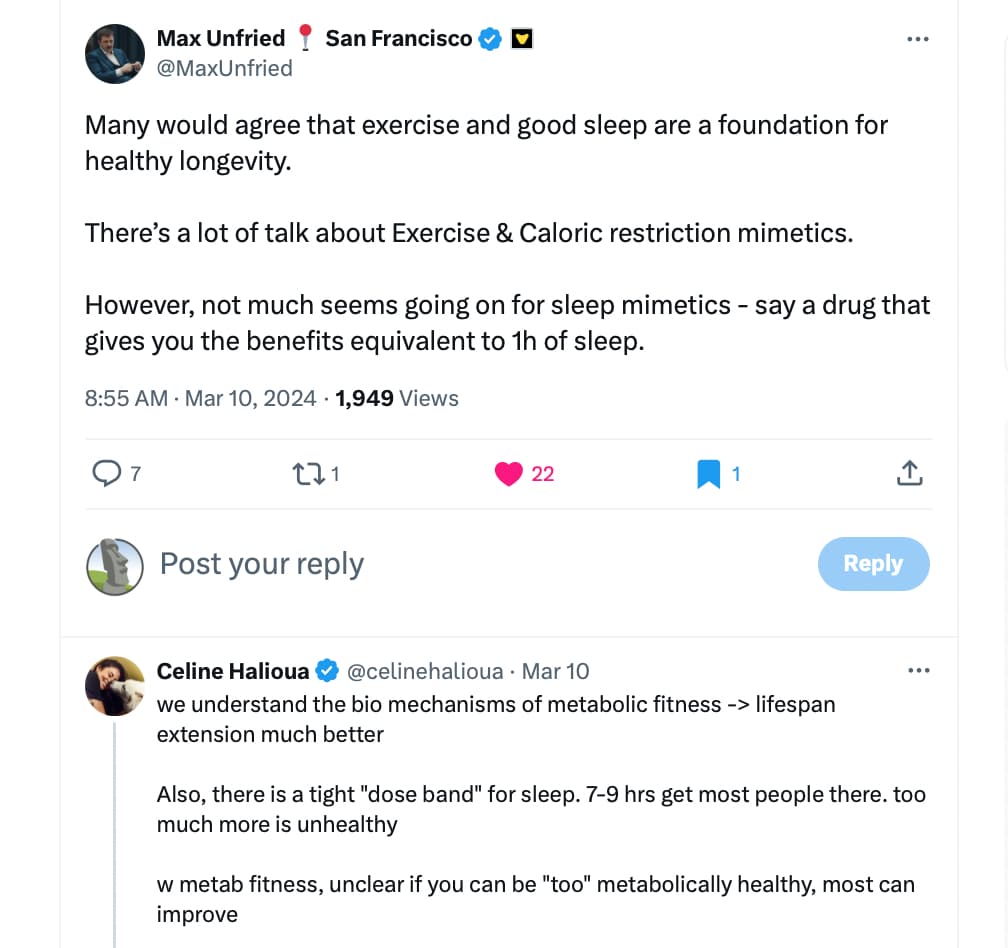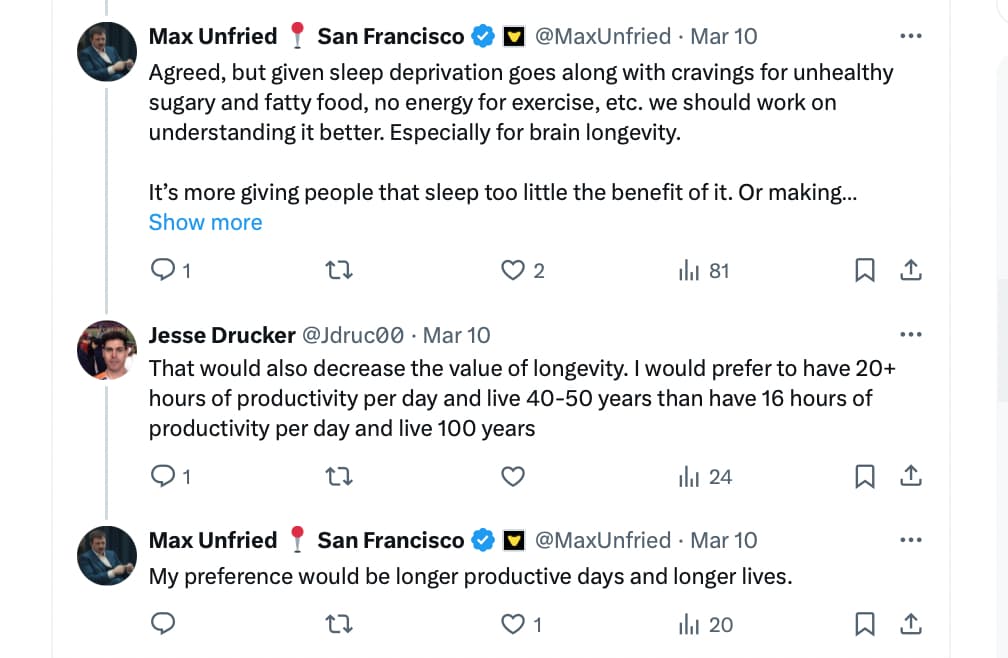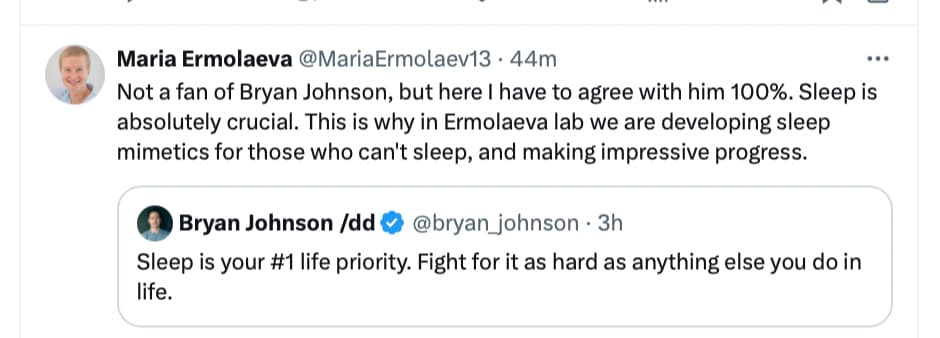Max makes a good point… (what do you think? @Guywholikessleep )
Source: https://x.com/MaxUnfried/status/1766855352824496172?s=20
FWIW, I think these “mimetic” ideas are cutting an important corner. How about a happiness memetic or a loving relationship memetic. I aim at becoming a functionally optimal human being. I have a long ways to go but I won’t get there faster by moving the goal posts.
I’ll bet there are many point of view on this topic.
Melatonin gives some of the benefits of sleep.
As Matthew Walker said in his book Why Se Sleep?“I was once fond of saying, “sleep is the third pillar of good health, alongside diet and exercise.” I have changed my tune. Sleep is more than a pillar; it is the foundation on which the other two health bastions sit. Take away the bedrock of sleep, or weaken it just a little, and careful eating or physical exercise become less than effective, as we shall see.”
Sleep has been shown to be involved in so many biological processes that there really isn’t one parameter of health that sleep doesn’t seem to influence in either active or passive ways.
I think the problem is there is still much left to understand about sleep. As I have stated before; what is sleep? What is actually sleeping? Why do we sleep? Sleep science has no consensus on these questions, I mean we still do not even understand if sleep is only a phenomenon in the brain or is it whole body. So when it comes to therapeutic appraoches, the theory of enhancing sleep or improving sleep is great , but what is meant by enhancing? Is it increasing time spent asleep? Is it spending more time in a specific stage of sleept? Is it improving how deep we sleep? How well rested one feels in the morning? Or is it enhancing sleep in a specific part of the brain or body? Too many unanswered questions to even know how one would “enhance/improve sleep”.
I think approaches targeting individuals with sleep disorders such as insommnia or shift workers will be what improves overall health and longevity of the population vs creating devices that “enhance sleep”. Targeting these disorders will unveil more answers to the questions we have about sleep and eventually lead to developing ways to “enhance sleep”.
With all that being said, there is issues with the fact that although depriving oneself of complete sleep can be deadly over time, individuals are still healthy even though everyone experiences some form of sleep deprivation for various periods( such as the birth of a child, studying late for a test, being out too late, etc). Invidiuals who get less than 6 hours of sleep over long stretches of time experience deficits in performance, various health metrics and increase risk to developing diseases. Yet, some people can function fine(rarely) and not be as affected as others or live a good life still.
Most of the health impacts when it comes to sleep come from accidents(such as making a bad decision like driving throughout the night resulting in a crash), potential social impacts associated with longevity(disruption of emotion regulating processes after sleep deprivation results in arguement with someone breaking a relationship , or differences in children sleep patterns causing bad performance in school (big implication on the impacts of this in terms of socioeconomic status, I.e. early school start times results in decrease in cognitive performance compounding with someone from low socioeconomic status and may have lower educational ability, could result in a child losing out on potential further education increasing chances of changing socioeconomic status) , or increase in risk of 4 deadly horse man Dr. Peter Attia talks about.
So how much health benefit is the direct impact of sleep itself contributing to longevity vs just enhancing/decreasing short term and long term risks? That’s a hard question to answer.
That’s why I think making sure you do all the things recommended(exercise, eating well and sleeping well) instead of focusing on just one to improve is the key to longevity. But if someone is experiencing a severe deficit in one of those areas (lets say someone who has insommnia and isnt getting 7-9 hours of sleep a night, but eats healthy and exercises regularly) then it would make sense to focus on improving that one specific area, but how much impact is that going to contribute to overall longevity?
Just some fun quesitons to pose.
At the end of the day sleep is obviously important to health. As for the person who said getting more sleep would decrease the value of longevity… I guess that is ultimately up to what you value. To me, what I value of longevity is enhancing the quality and quantity time I can spend with loves one. You don’t need to do things 20+ hours a day if you are efficient with your time…
I would disagree with the person who said that, but again that’s a very subjective question.
Sleep is good, so is melatonin. I am not sure what a sleep mimetic is and how it can beat a mixture of melatonin and sleep. (big timing issues here)
@John_Hemming I suppose the idea would be to get 33% more awake time per day in exchange for living 10% fewer years….maybe it’s a good trade off?
This would huge. My wife does not sleep well, and I do my share of working night shifts. A sleep mimetic would be great.
I’m sure all the other poor sleepers and shift workers would be happy too.
Well, not sleeping well can be theoretically fixed by an intervention that makes good sleep possible. That “fix”, is not a mimetic; a mimetic is a substitute that fulfills the same function through different means. It’s the difference between a sleeping pill that enables you to sleep (question: how restfully, and what are the side effects), and a pill you take so that you get all or most of the benefits from sleeping, but not actually having to sleep.
I don’t believe there can be mimetics for all human body functions. Take exercise. We’ve heard forever about the search for an exercise pill, pop a pill and get all the benefits of exercise without actually exercising. That will never happen. Sure, you might get some benefits from an exercise mimetic - muscle hypertrophy, endurance, vo2max etc. but some you will never get.
When you exercise, you also develop complex neural connectors within muscles that you only get with entraining, which allows you to CONTROL your muscle in complex ways. You can get big muscles, but your neurons need to learn how to control that muscle - and a pill can’t do it for you. Even more profoundly, exercising connects your CNS - central nervous system - (your brain) to your muscle control in incredibly complex ways. You become a tennis player by learning the skill, training, essentially exercising - no pill can teach your body to become a basketball player, or indeed how to even simply LIFT a weight at a gym as you EXERCISE, that’s a skill, a concerted effort of many muscles, balance and prioperception, none of which will ever come from a pill.
This is why I don’t believe in an exercise mimetic - at best you can mimic a few aspects - muscle hypertrophy even CV fitness, but that’s a small fraction of what exercise does.
I believe the same is even far more true of sleep: sleep is strictly essential the way exrecise is not. You can put a man in an iron lung, where he can live for decades with zero exercise, not even using muscles to breathe. But deprive someone of sleep completely, and they DIE, and die far sooner than from complete lack of food. We spend a third of our lives sleeping - clearly something insanely essential is happening for the body to devote this much effort to it. And incredibly complex, far, far, far more complex than exercise, with endless processes of memory formation, function of dream creation and so on, endlessly. I don’t believe for a second that there will ever be a pill or some mimetic you pop and substitute that for sleep. If you can’t even do that for exercise, how will you ever do it for sleep? Not a chance.
They might sooner find a mimetic for breathing… so, good luck, but a mimetic for sleep ain’t happening.
I think the relevance of the usage of the word “mimetic” is that Rapamycin is a fasting mimetic. In fact that is strictly wrong. Rapamycin inhibits mTOR as does fasting. On the other hand Rapamycin has other results and so does fasting (a different set).



